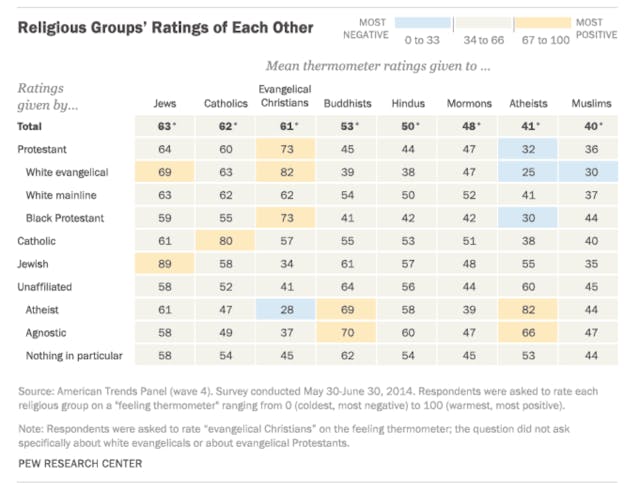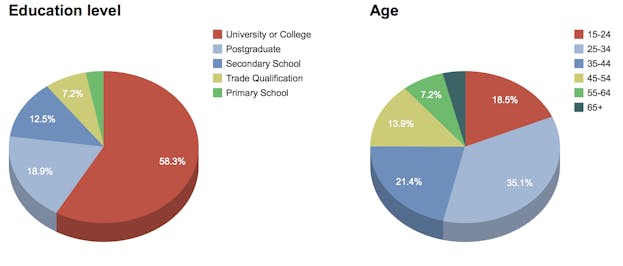On Tuesday evening, Craig Stephen Hicks murdered three young Muslims in Chapel Hill, North Carolina. The victims were a family: 23-year-old Deah Shaddy Barakat, his 21-year-old wife Yusor Mohammad, and her 19-year-old sister Razan Mohammad. Hicks has since turned himself in and has been charged with three counts of first degree murder. His motivation for the attack remains unclear.
But as details have begun to emerge about Hicks’s life prior to the murders, his antipathy toward religion has become increasingly clear. On his Facebook page, Hicks, 46, declared himself a supporter of “Atheists for Equality,” expressed his admiration for Richard Dawkins’s The God Delusion and Thomas Paine’s The Age of Reason, and condemned "radical" Christianity and Islam alike for their alleged ideological similarities.
Comparisons like those are easy to make, if you pick the right axis. For instance, America’s atheists might have more in common with American Muslims than Hicks seemed to believe. A 2014 Pew survey on American religious groups’ feelings about other religious cohorts found that Americans reserve their coldest feelings for atheists and Muslims, with atheists scoring an average of 41 degrees and Muslims an average of 40 on Pew’s feelings thermometer. A 2012 Gallup poll, meanwhile, found that Americans would prefer almost anyone for president to an atheist or a Muslim. When it came to views on other religions, the Pew survey showed that American atheists feel warmest toward religions with the least political presence in the United States, like Hinduism and Buddhism, and feel coldest toward Evangelical Christianity, Mormonism, and Islam— three faiths that regularly make the nightly news.

There is a distinction to be made between atheism in its pure sense, which describes anyone who does not believe in a god or gods, and New Atheism, the contemporary phenomenon of aggressive disbelief coupled with a persistent persecution narrative. Led by luminaries such as the late Christopher Hitchens and evolutionary biologist Richard Dawkins, New Atheism takes as its core creed a species of Enlightenment liberalism that exalts reason and free inquiry, without bothering to define reason or to explain what is worthy of inquiry, and why. For a school of thought that presents itself as intellectually robust, it is philosophically bankrupt and evidently blind to its similarities to the religions it derides. Consider Richard Dawkins’s response to the Chapel Hill murders:
How could any decent person NOT condemn the vile murder of three young US Muslims in Chapel Hill? http://t.co/pdtwnKqYG3
— Richard Dawkins (@RichardDawkins) February 11, 2015Dawkins takes the obviousness of his moral frame for granted; he doesn't feel the need to offer an earnest denouncement of these murders because he does not honestly believe any person could view them as an outgrowth of a system decent people like him are a part of. But this is a persistent problem with the New Atheist movement: Because it is more critical of religion than introspective about its own moral commitments, it assumes there is broad agreement about what constitutes decency, common sense, and reason. Yet in doing so, New Atheism tends to simply baptize the opinions of young, educated white men as the obviously rational approach to complicated socio-political problems. Thus prejudice in its own ranks goes unnoticed.
In 2013, Pew found that American atheists are overwhelmingly young and male, with 38 percent between the ages of 18 and 29, and 67 percent male. Pew also found that atheists in America tend to be college educated at higher rates than the rest of the population, with some 43 percent of atheists holding a college degree, compared to 29 percent of the general population. Polling data gathered by the Atheist Census depicts an even more pronounced split when it comes to age and education, and shares conclusions with Pew on the gender makeup of American atheism, with roughly two-thirds of atheists identifying as male.

With numbers like these, it’s no surprise that the id of New Atheism tends toward ordaining modes of thought and expression that privilege educated white men. For Richard Dawkins, the fact that Islam is inherently violent is as obvious as the fact that everyone should believe as much. More telling yet are his other prejudices, expressed with equal certitude and impatience: that western feminists have no legitimate problems compared to women in Muslim majority countries; that good pornography would set theocracies aright, had we the magnanimity to bestow it upon them. Dawkins is joined in his convictions about Islam by other New Atheists like Sam Harris and Bill Maher. In each case, the assumed obviousness of Islam’s putative wrong-headedness is accompanied by a thoroughgoing persecution narrative, in which those few brave atheists willing to offend Muslims view themselves as crusaders for common sense.
And perhaps this is another parallel with the religious attitudes New Atheism takes as its target: Like any number of global faiths, New Atheism presumes its framework and considers its truth-claims to be either self-evident or demonstrable by whatever means it already assumes legitimate. Its id is a product of the cultural and political landscape in which the majority of its congregants find themselves, which is again true of the religions it nonetheless essentializes to particular texts, creeds, and dogmas. And, like any other religion, its adherents can take its reasoning too far, and cross the line into violence. New Atheists like Dawkins will point out that nothing in New Atheism necessitates violence, and that many principles of the movement directly oppose it; they should be used to this kind of statement by now, as it’s precisely the argument they encounter and dismiss time and time again when it issues from religious faiths.
Perhaps this will be a moment of reflection for the New Atheist movement and its adherents. If nothing else, the takeaway should be that no form of reasoning, however obvious to a particular cohort, has a monopoly on righteousness. And no ideology, supernatural or not, has a monopoly on evil.
